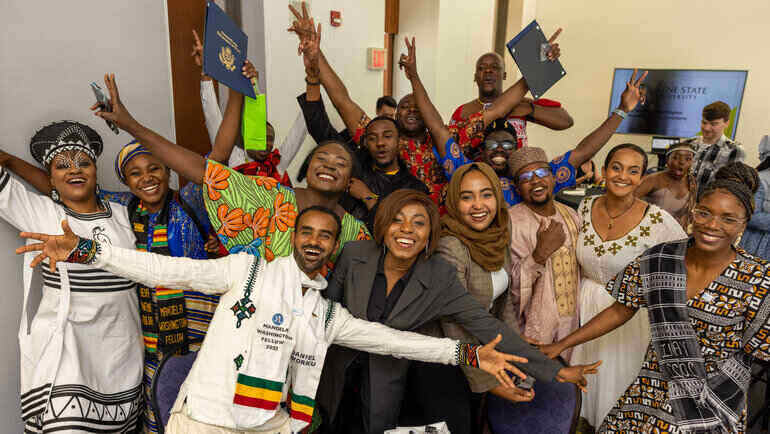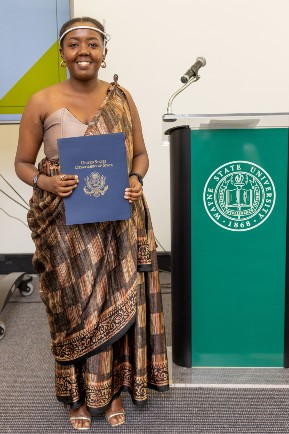Becoming a leader through the Mandela Washington Fellowship

For the second year in a row, Wayne State University was selected as an Institute Partner for the Mandela Washington Fellowship for Young African Leaders, a program of the U.S. Department of State.
25 emerging leaders from 18 countries in sub-Saharan Africa arrived in early June for a six-week Public Management Leadership Institute managed by the Office of International Programs in partnership with the WSU master of public administration program, which provided the academic content for the institute.
Fellows participated in executive-style training combined with site visits and meetings with partner organizations, to both enhance their leadership skills and allow them to develop connections with organizations and professionals operating in Detroit and in southeast Michigan.
Ange Iliza, a journalist from Rwanda, wrote this post about her fellowship experience at Wayne State.
During one of many interactive leadership sessions, fellows were asked to write down moments or events that changed their lives. As we all quietly wrote down our moments, one of the fellows walked out of the room. I could tell he was holding back tears.
“The question was very triggering for me. I couldn’t hold back as I thought of my transformative journey. I couldn’t believe I was here,” Muchinga Mutambo, a public health worker from Zambia, who later became a dear friend, told me.
Muchinga’s experience is a nutshell of a typical fellows’ experience at Wayne State University in Detroit. For six weeks, it was a rollercoaster of emotions of excitement, nervousness sometimes for publicly delivering your own Ignite talk or rooting for a friend to win, wiping off tears while smiling so hard as you read a bunch of compliments from people you have known for only five weeks but feel like lifetime friends, the list goes on…

When I applied for the Mandela Washington Fellowship, my concept of leadership was complex and misinformed. I expected to come back and become a leader of something, anything, a founder, an elected member, a CEO, or a team leader. Six weeks down the road, I am relieved that I was wrong. How is that you ask? Read on…
My cohort was composed of 25 fellows from 18 African countries. Our professional backgrounds varied from medical doctors, lawyers, social workers, economic specialists and public servants to scientists and researchers. We had many differences, but we all had one thing in common: the need to change our communities. In a matter of weeks, we created a strong connection and relationships that would usually take a lifetime.
It was my first time being part of a group that is so diverse, intelligent and competitive. I had made it a goal to sit and converse with at least one fellow every day. It was a thrill after a thrill. Sharing experiences, aspirations, dinners, drinks, and dreams was always a memorable experience, shout out to my roommates-turned-best friends!
Relationship building was not random. The fellowship is designed to fundamentally encourage exactly that. Community and cultural activities, group discussions and exercises, games, family visits and dinners, frequent networking events and unstructured networking hours are all opportunities to connect and build relationships.
Not just with the fellows but community members, state officials, and local impact leaders. The list is endless. If you are planning to attend the fellowship, prepare a bag for business cards, and most importantly, prepare a good pitch for when you meet a city mayor and you’re too awed to properly introduce yourself.
As a journalist, I had an idea of how important person-to-person relationships are. My editor says journalists are as good as the people they know. The saying applies to leadership. Having a network of not just connections but friends from almost every country on the continent is arguably a professional achievement.
After six weeks, I returned to Kigali, my home, with new friends, others returned with new mentors, job offers, and prospects. Life is never the same after attending the Mandela Washington Fellowship, it should never be the same when you have people you call friends from multiple continents.
During his speech at the Mandela Washington Fellowship Summit, Secretary of State Anthony Blinken emphasized the role of relationships on a bigger scale: “You have experienced America uniquely and unforgettably. And you shared stories with other fellows about your countries and cultures. That kind of exchange can seem simple, but it is also very powerful because friendships between people lead to stronger ties between nations,” he told the 700 African leaders.
Alaa Abusufian Dafalla, a medical doctor from Sudan and a Rhodes scholar, focuses on improving African countries' health care workforce. She says leaders need to support each other: “I was connected by a fellow friend of mine to someone in his country working in the health workforce and we are already collaborating. I think what had the most impact on me is that now I have 24 friends who believe in me and support me. That sort of interpersonal bond and support is so important because as leaders we face many challenges that can be demoralizing. Together we can achieve more,” she said.
Acquiring a more enthusiastic understanding of leadership took us six weeks but if I had to pick one word, I would go with relationships. So yes, I was relieved that we do not all have to be elected for positions to lead our communities to the changes we envision. Impacting a community requires strong friendships.